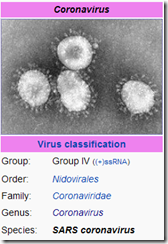Here's one to keep an eye on that might explain undiagnosed respiratory outbreaks in the Middle East.
The only previous human infections with animal coronaviruses I am aware of are SARS cases. It would be informative to know the relationship between this virus and the 2003 SARS virus, as well as the timing and outcome of the case. SARS, of course, is a bat coronavirus.
Published Date: 2012-09-20 15:51:26
Subject: PRO/EDR> Novel coronavirus - Saudi Arabia: human isolate
Archive Number: 20120920.1302733
NOVEL CORONAVIRUS - SAUDI ARABIA: HUMAN ISOLATE
***********************************************
A ProMED-mail post
ProMED-mail is a program of the
International Society for Infectious Diseases
Date: Sat 15 Sep 2012
From: Ali Mohamed Zaki [edited]
A new human coronavirus was isolated from a patient with pneumonia by Dr Ali Mohamed Zaki at the Virology Laboratory of Dr Soliman Fakeeh Hospital Jeddah Saudi Arabia.
The virus was isolated from sputum of a male patient aged 60 years old presenting with pneumonia associated with acute renal failure. The virus grows readily on Vero cells and LLC-MK2 cells producing CPE in the form of rounding and syncetia formation.
[The clinical isolate] was initially tested for influenza virus A, influenza virus B, parainfluenza virus, enterovirus and adenovirus, with negative results. Testing with a pancoronavirus RT-PCR yielded a band at a molecular weight appropriate for a coronavirus. The virus RNA was tested also in Dr. Ron Fouchier's laboratory in the Netherlands and was confirmed to be a new member of the beta group of corononaviruses, closely related to bat coronaviruses. Further analysis is being carried out in the Netherlands.
The Virology Laboratory at the Dr Fakeeh Hospital will be happy to collaborate with others in studies of this virus.
--
Ali Mohamed Zaki
Professor of Microbiology
Dr Fakeeh hospital Jeddah Saudi Arabia
[ProMED-mail welcomes the opportunity to communicate Dr Ali Mohamed Zaki's invitation.
Human coronaviruses were 1st isolated in the mid 1960's from volunteers at the Medical Research Council Common Cold Unit in Salisbury, England. The family _Coronaviridae_ is comprised of a group of RNA-containing viruses that are associated with respiratory infections in humans and animals, including pigs, cats, dogs, mice and chickens. The group was so named because of the crown-like projections on its surfaces. Coronaviruses are enveloped viruses with a positive-sense RNA genome and with a nucleocapsid of helical symmetry. The genomic size of coronaviruses ranges from approximately 26 to 32 kilobases.
The classification of the coronaviruses is complex and subject to progressive revision. There are at least 3 genera: The genus _Alphacoronavirus_, which includes bat, human and porcine viruses; the genus _Betacoronavirus_, which includes a murine species; and the genus _Gamacoronavirus_, which includes avian and marine mammal coronaviruses. - Mod.CP
The only previous human infections with animal coronaviruses I am aware of are SARS cases. It would be informative to know the relationship between this virus and the 2003 SARS virus, as well as the timing and outcome of the case. SARS, of course, is a bat coronavirus.
Published Date: 2012-09-20 15:51:26
Subject: PRO/EDR> Novel coronavirus - Saudi Arabia: human isolate
Archive Number: 20120920.1302733
NOVEL CORONAVIRUS - SAUDI ARABIA: HUMAN ISOLATE
***********************************************
A ProMED-mail post
ProMED-mail is a program of the
International Society for Infectious Diseases
Date: Sat 15 Sep 2012
From: Ali Mohamed Zaki [edited]
A new human coronavirus was isolated from a patient with pneumonia by Dr Ali Mohamed Zaki at the Virology Laboratory of Dr Soliman Fakeeh Hospital Jeddah Saudi Arabia.
The virus was isolated from sputum of a male patient aged 60 years old presenting with pneumonia associated with acute renal failure. The virus grows readily on Vero cells and LLC-MK2 cells producing CPE in the form of rounding and syncetia formation.
[The clinical isolate] was initially tested for influenza virus A, influenza virus B, parainfluenza virus, enterovirus and adenovirus, with negative results. Testing with a pancoronavirus RT-PCR yielded a band at a molecular weight appropriate for a coronavirus. The virus RNA was tested also in Dr. Ron Fouchier's laboratory in the Netherlands and was confirmed to be a new member of the beta group of corononaviruses, closely related to bat coronaviruses. Further analysis is being carried out in the Netherlands.
The Virology Laboratory at the Dr Fakeeh Hospital will be happy to collaborate with others in studies of this virus.
--
Ali Mohamed Zaki
Professor of Microbiology
Dr Fakeeh hospital Jeddah Saudi Arabia
[ProMED-mail welcomes the opportunity to communicate Dr Ali Mohamed Zaki's invitation.
Human coronaviruses were 1st isolated in the mid 1960's from volunteers at the Medical Research Council Common Cold Unit in Salisbury, England. The family _Coronaviridae_ is comprised of a group of RNA-containing viruses that are associated with respiratory infections in humans and animals, including pigs, cats, dogs, mice and chickens. The group was so named because of the crown-like projections on its surfaces. Coronaviruses are enveloped viruses with a positive-sense RNA genome and with a nucleocapsid of helical symmetry. The genomic size of coronaviruses ranges from approximately 26 to 32 kilobases.
The classification of the coronaviruses is complex and subject to progressive revision. There are at least 3 genera: The genus _Alphacoronavirus_, which includes bat, human and porcine viruses; the genus _Betacoronavirus_, which includes a murine species; and the genus _Gamacoronavirus_, which includes avian and marine mammal coronaviruses. - Mod.CP





Comment